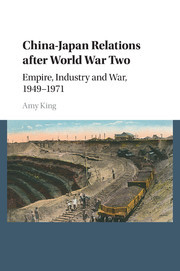Description
China–Japan Relations after World War Two
Empire, Industry and War, 1949–1971
Author: King Amy
A rich empirical account of China's post-war foreign economic policy towards Japan, drawing on recently declassified Chinese sources.
Language: English
Subject for China–Japan Relations after World War Two:
China-Japan Relations after World War Two
Publication date: 12-2017
Support: Print on demand
Publication date: 12-2017
Support: Print on demand
China-Japan Relations after World War Two
Publication date: 06-2016
280 p. · 15.8x23.5 cm · Hardback
Publication date: 06-2016
280 p. · 15.8x23.5 cm · Hardback
Description
/li>Contents
/li>Biography
/li>
A rich empirical account of China's foreign economic policy towards Japan after World War Two, drawing on hundreds of recently declassified Chinese sources. Amy King offers an innovative conceptual framework for the role of ideas in shaping foreign policy, and examines how China's Communist leaders conceived of Japan after the war. The book shows how Japan became China's most important economic partner in 1971, despite the recent history of war and the ongoing Cold War divide between the two countries. It explains that China's Communist leaders saw Japan as a symbol of a modern, industrialised nation, and Japanese goods, technology and expertise as crucial in strengthening China's economy and military. For China and Japan, the years between 1949 and 1971 were not simply a moment disrupted by the Cold War, but rather an important moment of non-Western modernisation stemming from the legacy of Japanese empire, industry and war in China.
1. Introduction; 2. Empire, industry and war in the China-Japan relationship; 3. Trading with the enemy, 1949–52; 4. Revolution through industrialisation, 1953–7; 5. When ideas collide, 1958–July 1960; 6. Comparing ourselves with Japan, August 1960–5; Conclusion: on the eve of diplomatic normalisation, 1966–71; Appendix; Note on sources; Bibliography; Index.
Amy King is a Senior Lecturer at the Australian National University, an Australian Research Council DECRA Fellow, and a Westpac Research Fellow. Her research focuses on Chinese foreign and security policy, China-Japan relations, and the international relations of the Asia-Pacific region. She is currently engaged in a three-year research project examining China's role in shaping the international economic order. A graduate of the University of Oxford, Amy has also undertaken intensive language study and fieldwork in China, Japan, and Taiwan over the past fifteen years.
© 2024 LAVOISIER S.A.S.




